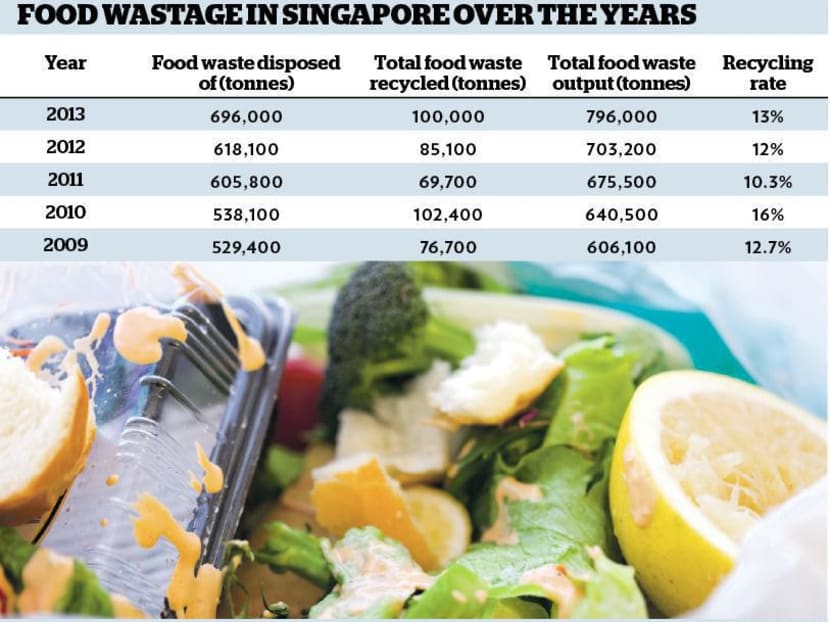Recycling of foodwaste yet to catch on in Singapore
SINGAPORE — The practice of recycling food waste has not caught on, despite efforts to curb the growing amount of such waste generated.
SINGAPORE — The practice of recycling food waste has not caught on, despite efforts to curb the growing amount of such waste generated.
Food recycling rates in Singapore rose for the second consecutive year in 2013, as 13 per cent of the 796,000 tonnes of food waste generated were recycled last year, figures from the National Environment Agency (NEA) show.
However, last year’s food recycling rate was still below the 16 per cent of food waste recycled in 2010.
Industry players said a myriad of reasons account for the low recycling rates, including the lack of infrastructure as well as manpower and logistical costs of sorting food waste.
More importantly, they felt the main contributors of food waste — food caterers, hawker centres, restaurants, supermarkets and hotels — have yet to change their mindset.
Food recycling company Eco-Wiz CEO Renee Mison said food waste recycling is not a priority for some food and beverage (F&B) outlets here. “Some operators feel the effort to reduce food waste is not directly related to their performance or productivity. To them, it’s something good, but it’s not something they have to do now.”
“It’s basically our culture,” said Mr Daniel Ang, president of the Association of Catering Professionals Singapore. “We just dump everything; throw (food away). Nobody collects it for recycling,” he added.
The NEA said the bulk of food waste, mostly uncooked kitchen food and post-meal leftovers, is currently disposed of at waste-to-energy incineration plants. The part that can be recycled, which comprises clean waste such as spent grains from beer brewing, bread waste and soya bean waste, is converted into animal feed.
Some of the food waste recycling technology offered in Singapore is also able to convert food waste to compost, liquid or reusable water for washing.
The lack of infrastructure is a hurdle, said Mr Ang, who is also CEO of catering companies Elsie’s Kitchen and Continental Delight. He added that getting caterers to participate in food recycling is “not really an issue”, but the basic infrastructure — such as the provision of bins to sort food waste from other refuse — should first be provided.
Independent enterprises or the Government could step in to provide these bins and the collection of food waste, he suggested.
A cost-benefit analysis study commissioned by the NEA in 2010 shows there is “a net cost” to recycle food waste at a centralised recycling facility for such refuse, largely due to the costs from collecting and processing the waste. These costs could be lowered with better technology, more efficient operations and improved waste segregation, said the agency.
To address cost concerns and encourage smaller F&B firms to invest in food recycling technology, Eco-Wiz recently launched a smaller version of its food waste digesters, which cost less than S$10,000, but have the capacity to process 50kg of food waste a day.
Currently, its machines offer various capacities to process food waste, from 100kg to 1,000kg a day, with costs between S$30,000 and about S$80,000.
Four hotels and an institute of higher learning have been awarded grants under an NEA fund to recycle food waste generated on-site using food waste digesters.
The aggregate grant awarded to these projects amounted to about S$342,900, with each project lasting three to three-and-a-half years. “The total estimated food waste recycling tonnage over the duration of these projects is 3,805 tonnes,” said the NEA.
Co-founder Nichol Ng of Food Bank, a non-profit organisation that collects excess food and redistributes it to the needy, said some firms are concerned about the costs of separating food as well as the collection of excess food.
While Ms Ng has noticed a growing public awareness about the need to save food, she said guidelines to encourage more to be done are lacking. For instance, some people do not know how to reuse food items that are odd or packaged wrongly and that would lead to food wastage, she said.







